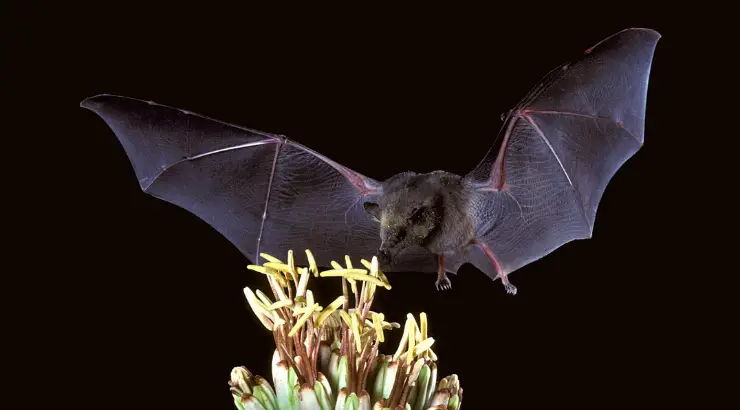Happy International Bat Appreciation Day! Why on Earth Would We Celebrate Bats?
April 17 is International Bat Appreciation Day, a day reminding us to show love to our flying friends who play a key role in ecosystems all over the world.

Happy International Bat Appreciation Day!
(TMU) — Today, April 17th, is celebrated as International Bat Appreciation Day—a day meant to remind us to show love to our flying pollinator friends who play a critical role in environments and ecosystems all over the world.
Bats are the common name for roughly 1,400 species that have been discovered, and these fabulous creatures make up about 20 percent of mammal species after rodents. An estimated 48 bat species live in the United States, and three states—Texas, Oklahoma, and Virginia—have their own official state bats. What makes bats unique among mammals is their ability to fly naturally and in a sustained manner.
In general, bats are a very misunderstood creature. No doubt, we can understand if a bat flying in the middle of the night gives some people the creeps—their depiction in pop culture associates them with spooky things like Dracula, the blood-sucking vampire.

April 17th is National #BatAppreciationDay. Bats play an important role in many ecosystems around the world. They are crucial pollinators for cactus species and many other tropical plants, they help control insect populations & also disperse seeds!
Why are bats important to you? pic.twitter.com/YLB69M22Ms
— EveryBat (@EveryBat) April 17, 2020
But as various scientific studies show, most bats eat a wide variety of insects, balancing the population of such creepy-crawlers and nuisance bugs like locusts, flies, scorpions, moths, centipedes, and mosquitos.
Other bat species are frugivores and enjoy such fruits as figs, mangoes, bananas, and dates, as well as seeds and the pollen of flowers. And yes, three types of vampire bats do exist in Central and South America, but humans have no reason to fear them.
Most bats are nocturnal creatures that come out at night, with many using their extreme sense of hearing and ability to see in the dark to get around. A large variety of bats use a trick called echolocation that relies on sonar to navigate, avoid obstacles, and find food—not unlike dolphins. However, some bats in Southeast Asia fly and hunt their meals during the daytime.

Today is International Bat appreciation day 🦇 pic.twitter.com/EdC4iaQemS
— Wildlife World Zoo, Aquarium & Safari Park (@ZooWildlife) April 17, 2020
And while bees and butterflies often get the lion’s share of credit for their role as pollinators, bats are no less important to providing us with a crucial link in our food supply. As the Bat Conservation Trust explains, some 500 plant species rely on bats to pollinate their flowers. This includes various species of banana, mango, guava, durian, and agave—the succulent, pollen-rich plant that provides us with tequila. Many of these plants actually co-evolved with bats over the course of millennia.
Before reading the above information, some of you may have asked: why would we be celebrating these god-forsaken creatures when they were the source of the coronavirus that causes CoViD-19? Aren’t they the reason that we’re being quarantined indoors, jobless and bored, and now we’re supposed to celebrate them?
Well, as Deutsche Welle aptly put it: a bat didn’t “cause” the coronavirus pandemic. We did. More specifically, it was likely the fault of the rampant, illegal trafficking of wild animals.
Today is International Bat Appreciation Day! Despite all the bad press, bats are actually pretty cool and very important in nature. We have a lot to learn about bats, viruses and disease – read our blog to learn more:https://t.co/wCfEfAnNY9#virology #bats #batappreciationday pic.twitter.com/Gt7A67I5B
— The Science Social (@TheSciSocial) April 17, 2020
While some bats have been shown to carry a number of infections deadly to humans—including Ebola, rabies, and SARS (severe acute respiratory syndrome), among others—the vast majority of bats aren’t infected. There also isn’t any solid scientific proof that CoViD-19 took flight from bats yet, although there is plenty of conjecture and speculation. Some believe that pangolins may have acted as an intermediary for the novel coronavirus. Either way, bats that do carry coronaviruses pose zero threat to humans provided they are left undisturbed in the wild.
Sadly, a combination of misinformation, long-standing ignorance, and mass hysteria over the coronavirus led to villagers in Peru attacking our winged friends last month and killing hundreds of the creatures.
The problem led to Peru’s National Service of Wild Forests and Fauna (SERFOR) reminding locals that “bats are not our enemies,” and explaining that “70 percent of the [bat] species in the world feed off insects, many of which are harmful to agriculture and our health, like mosquitoes that spread dengue and other diseases.”
So with that in mind, let’s remember that bats are nothing to be scared of. Indeed, we hope that we’ve provided our readers with plenty of good reasons to not only appreciate bats, but to cherish and protect these good friends to our species. When it comes to bats, the facts make clear that to know them is to love them.
By Elias Marat | Creative Commons | TheMindUnleashed.com
No comments:
Post a Comment